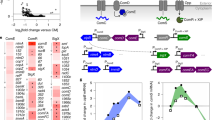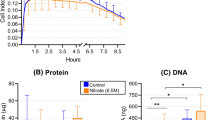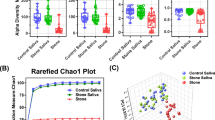Abstract
AMONG the very heterogeneous bacterial population of the mouth are to be found large numbers of organisms such as streptococci, staphylococci and lactobacilli, which require some source of fermentable carbohydrate from which to obtain energy for growth and to maintain their normal metabolic processes. It has generally been assumed that, in the mouth, food constituents such as starch, after breakdown by salivary amylase (ptyalin), or simple sugars, provide this source. The observations presented in a preliminary form here show that some groups of organisms in raw saliva are able to break down and make available the salivary mucins themselves.
This is a preview of subscription content, access via your institution
Access options
Subscribe to this journal
Receive 51 print issues and online access
$199.00 per year
only $3.90 per issue
Buy this article
- Purchase on Springer Link
- Instant access to full article PDF
Prices may be subject to local taxes which are calculated during checkout
Similar content being viewed by others
References
Elson, L. A., and Morgan, W. T. J., Biochem. J., 27, 1824 (1933).
SØrensen, M., and Haaguard, G., Biochem. Z., 260, 247 (1933).
Morgan, W. T. J., and Elson, L. A., Biochem. J., 28, 988 (1934).
Schiff, F., and Weiler, G., Biochem. Z., 235, 454; 239, 489 (1931).
Morgan, W. T. J., Nature, 158, 759 (1946).
Hartman, G., "Group Antigens in Human Organs" ( Saabye and Christensen., Denmark, 1941).
Author information
Authors and Affiliations
Rights and permissions
About this article
Cite this article
ROGERS, H. Bacterial Hydrolysis and Utilization of Polysaccharide-like Substances (‘Mucin') in Saliva. Nature 161, 815–816 (1948). https://doi.org/10.1038/161815a0
Issue Date:
DOI: https://doi.org/10.1038/161815a0
Comments
By submitting a comment you agree to abide by our Terms and Community Guidelines. If you find something abusive or that does not comply with our terms or guidelines please flag it as inappropriate.



